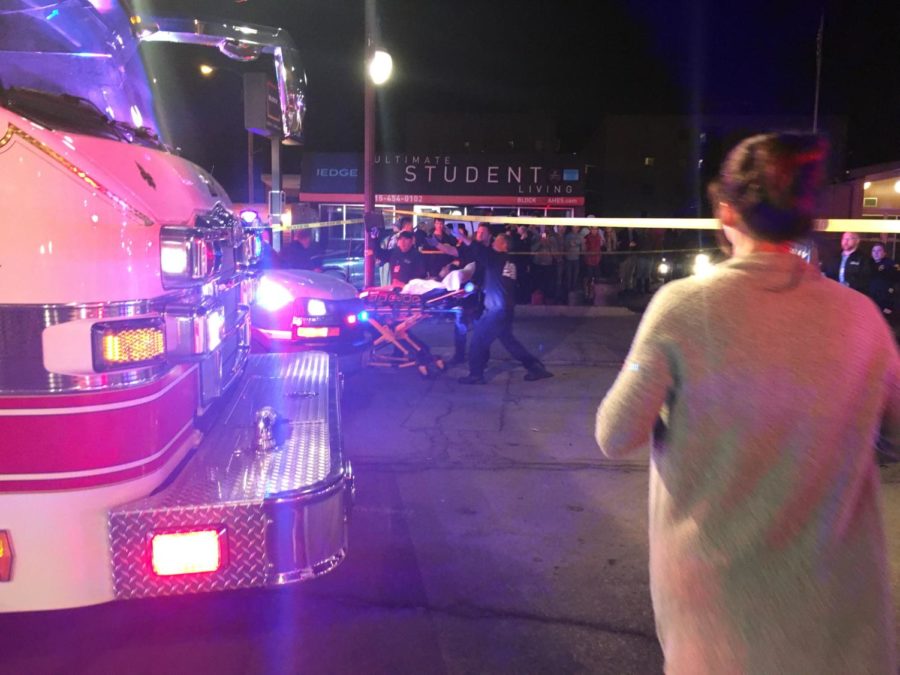- App Content
- App Content / News
- News
- News / Politics And Administration
- News / Politics And Administration / Campus
- News / Politics And Administration / City
ISU Alerts and Clery crimes: When is an alert necessary?
An onlooker watches as one of the victims of an overnight shooting on Welch Avenue is carried into an ambulance on a stretcher on Feb. 19.
January 25, 2018
Late Monday, Dec. 11, 2017, a drive-by shooting took place on Stanton Avenue. One female victim suffered a non-life threatening gunshot wound to the leg. The suspected vehicle, a small black sedan, fled the scene.
Shortly after the shooting, Ames Police tweeted about the incident, advising residents to stay away from the area as it was being processed as a crime scene.
Ames PD is working a drive by shooting please stay away from Stanton Avenue between Knapp and Storm as it is a crime scene. This is NOT an active shooter situation.
— Ames Police (@AmesPolice) December 12, 2017
The shooting occurred just blocks from campus, but no ISU Alert was issued.
The ISU Alert system sends out emails, texts and telephone calls to students and staff of the university during emergency situations.
How do the Ames and Iowa State University Police assess the severity of cases like drive-by shootings and decide whether or not to issue an ISU Alert?
The Clery Act, according to studentaid.ed.gov, is “a federal statute requiring colleges and universities participating in federal financial aid programs to maintain and disclose campus crime statistics and security information.”
Since Iowa State University participates in federal financial aid programs, they are obligated to follow the Clery Act.
The responsibilities listed in the Clery Act include sending out timely warnings and emergency notifications for crimes listed in the Clery Act.
Clery crimes include sexual assault, robberies, homicide and other serious offenses. However, not all Clery crimes or emergency situations qualify for an ISU Alert.
Why wouldn’t a drive-by shooting just blocks away from campus qualify for an ISU Alert?
Carrie Jacobs works as the deputy chief of investigative services for the Iowa State University Police Department. Jacobs said an ISU Alert wasn’t sent out after the Stanton shooting due to the nature of the case.
“The incident occurred very quickly,” Jacobs said. “[Drive-by shootings] do not go on for a long time; they are usually over and done with within minutes. If the situation no longer poses a threat to the community, we are not going to release an ISU Alert.”
Jacobs said that ISU Alert-qualifying incidents are active killer scenarios, severe weather, bomb threats or other incidents that are an ongoing threat to campus safety.
If the incident occurs off campus, but there is a threat to campus safety, Ames Police will communicate with ISU Police to help decide if an ISU Alert should be sent out, Jacobs said.
“We have very few people who can send out the [ISU] Alert. Our senior leadership can send out the Alert, as well as University Services,” Jacobs said. “We have switched systems for the ISU Alert, so all managers on call, our upper administration (Chief, Assistant Chief, and Deputy Chief), as well as two directors and our dispatchers will be able to send out ISU Alerts.”
Jacobs said that ISU Alerts can be difficult, as the public may respond negatively to an alert they didn’t think was necessary, or wonder why an Alert wasn’t sent out when they think it should have.
Ames Police Commander Geoff Huff said he understands how ISU Alerts could be tricky.
“Iowa State is really between a rock and a hard place on the alerts because it seems like if they don’t have an alert, they get criticized, and if they do, they get criticized,” Huff said. “I know there’s a lot of pressure on them.”
Regarding the Stanton shooting, Huff said there wasn’t an ongoing threat to the safety of the university.
“[The shooting] was off campus. At the time it was what appeared to be an isolated incident,” Huff said.
In response to a tweet asking why an ISU Alert was not released the night of the Stanton shooting, the Iowa State Police Department tweeted explaining why they chose not to send out an alert.
There was not an ongoing or continued threat to the campus community. The incident took place off campus and @AmesPolice is the primary agency. Social media can help out when an incident doesn’t meet qualifications for an ISU Alert.
— IowaStateU Police (@ISUPD) December 12, 2017
Both Ames and Iowa State University Police use social media as a tool to keep the Ames community informed about robberies, road closures, weather conditions or any other updates that affect the area.
If a Clery crime is committed on campus property, but there isn’t a need for an ISU Alert, the university will send out a timely warning email providing information of the incident.
On Wednesday, Iowa State University sent out an email about a sexual assault that occurred in an apartment in University Village. Included in the timely warning were descriptions of the incident, along with resources for sexual assault prevention and response.







